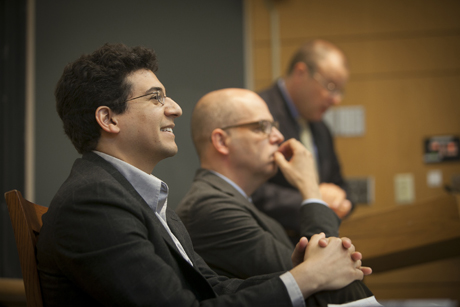Experts lament fragmented U.S. political system
By Kathy Hovis

Although the world is safer today than it’s ever been, the United States still faces major challenges in international relations, professors told alumni at the “America and the World” panel discussion June 7 during Reunion 2013.
Excessive partisanship and bureaucratic fragmentation in Washington undermine policymaking and too often result in inconsistent responses to events around the world, they said.
Nicolas van de Walle, the Maxwell M. Upson Professor of Government, and Aziz Rana, associate professor of law, joined moderator Fredrik Logevall, the John S. Knight Professor of International Studies and Cornell’s vice provost for international relations, for a discussion of America’s evolving economic and political relations with the rest of the world and the critical challenges facing President Barack Obama.
“I’m not all that optimistic about major changes in the future,” van de Walle said. “The Washington bureaucracy is an incredibly complicated Rube Goldberg contraption that is too fragmented and uncoordinated to consistently produce timely and proactive foreign policy.”
Causes of the fragmented system are myriad, van de Walle said, and include excessive partisanship, a weakened diplomatic corps, empowered special interests and the overarching influence of the military on foreign policy decisions.
“Washington is suffering from interagency fragmentation and PADD, presidential attention deficit disorder,” van de Walle said. Each cabinet level agency has its own foreign policy, the president’s appointments are being shot down at unprecedented levels, and the president doesn’t have time to deal with anything but the most pressing foreign policy issues, he said.
Rana pointed out another challenge facing America’s foreign policy efforts: inconsistent reactions to recent uprisings in the Middle East. In some cases, U.S. policy has supported a managed transition using non-violent means, while in other countries, the U.S. government supports drastic measures to bring about regime change.
“American response in the region has been inconsistent,” Rana said.
U.S. leaders also face problems when they try to combine a humanitarian mission with national security concerns. When political strife hits countries such as Libya, Afghanistan and Pakistan, the United States tries to intervene, Rana said. “But it’s not clear that the efforts are improving the situation on the ground for people who live there,” he said.
In all of these discussions, the voices and ideas of academics have too often been ignored, van de Walle said, while special interest groups and lobbyists hold court with lawmakers.
None of the problems are new to Washington, van de Walle and Rana agreed, citing examples of infighting and party battles from the time of George Washington, but improvement seems unlikely as long as both parties try to continue to outflank each other rather than fix a broken system, they said.
Media Contact
Get Cornell news delivered right to your inbox.
Subscribe